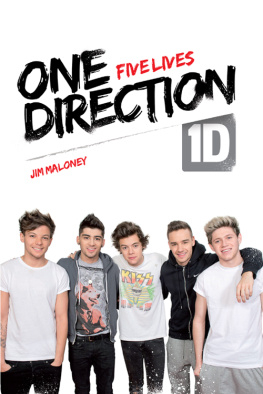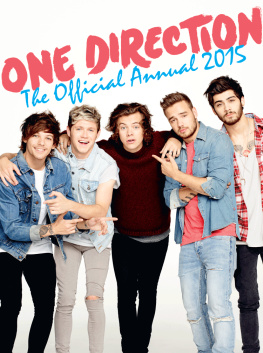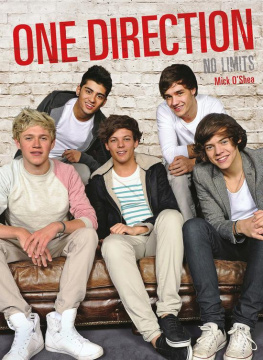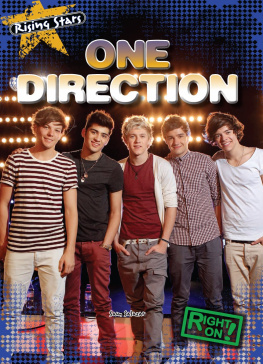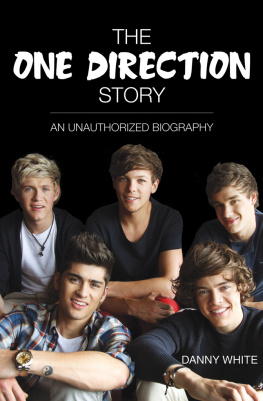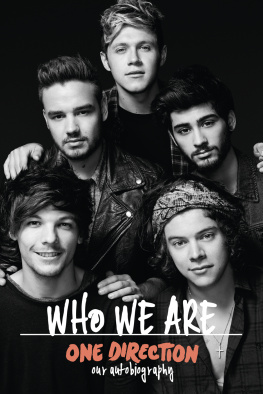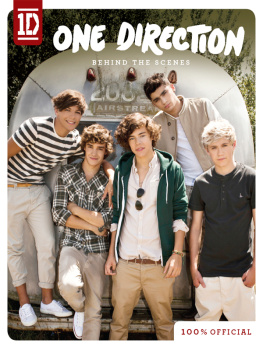Copyright 2013 Omnibus Press
This edition 2013 Omnibus Press
(A Division of Music Sales Limited, 14-15 Berners Street, London W1T 3LJ)
Cover designed by Fresh Lemon
Picture research by Jacqui Black
EISBN: 978-1-78323-005-1
The Author hereby asserts his / her right to be identified as the author of this work in accordance with Sections 77 to 78 of the Copyright, Designs and Patents Act 1988.
All rights reserved. No part of this book may be reproduced in any form or by any electronic or mechanical means, including information storage and retrieval systems, without permission in writing from the publisher, except by a reviewer who may quote brief passages.
Every effort has been made to trace the copyright holders of the photographs in this book, but one or two were unreachable. We would be grateful if the photographers concerned would contact us.
A catalogue record of this book is available from the British Library.
For all your musical needs including instruments, sheet music and accessories, visit www.musicroom.com
For on-demand sheet music straight to your home printer, visit www.sheetmusicdirect.com
Introduction
T heyre going crazy, crazy, crazy, as they joyously declared in their anthem Live While Were Young. Theres little doubt about that: normal life has been blown away as these boys travel around the world, causing near-hysteria amongst fans and a headache for the police and security who are valiantly trying to keep control.
In an astonishingly short space of time they were only formed towards the end of 2010 five teenage boys have gone from being just average normal kids, to worldwide stars. Living life while theyre young is no idle boast for these boys: they have taken life by the neck and given it a good shaking!
Harry, Liam, Louis, Niall and Zayn have been going in One Direction only since the band was formed. But the speed and magnitude of their success has amazed them and their influential management team as much as anyone else.
Their debut album, Up All Night, shot to the top of the charts in the UK and across the Atlantic in America. Their debut single, What Makes You Beautiful, was number one in the UK and made the highest entry for a British act in the US singles charts for 14 years. What makes this even more remarkable is that over 100,000 copies were downloaded before it was even played on US radio stations. Subsequent singles and albums have topped the charts all over the world. At the prestigious Brit Awards in February 2012, What Makes You Beautiful was voted best single.
So how did it all happen? Well, it springs from failure of sorts. Reaching the latter stages of the biggest television talent show in the world was a tremendous achievement for Harry, Liam, Louis, Niall and Zayn as individual singers. Not only did it turn them into local celebrities in their hometowns, it raised their profile further afield. The X Factor was the most watched TV show in the UK, seen by millions. But, having come so far in the competition, things looked like they had come to an end when each of them failed to make it to the finals.
Then came the crucial turning point. The shows judges, Simon Cowell, Louis Walsh and Nicole Scherzinger, have all claimed to be the one to first suggest putting the five rejects into a band. It was to be one of the best decisions in the history of pop music at least in terms of their subsequent, record-breaking international success.
No one back then could have dreamt of what was to come. The five boys had just three weeks in which to form themselves into a band. Harmonising and the apportioning of lines to sing was all new to them, as was the concept of five individuals hopes and aspirations coming together as one. They barely knew each other and it could quite easily have gone disastrously wrong, but just how right they got it would take everyone by surprise. Simon Cowell said that the moment they first sang in front of him as a group was when he knew they had something special.
Having progressed to the live finals, One Directions high-energy weekly performances were a highlight for many. The screams from the audience were louder for them than for any other act and became increasingly audible each week. The judges loved them too. They looked and sounded right for a boy band, their energy and enthusiasm were as infectious as the obvious fun they were having. It was feel-good time when they were onstage, and their professionalism, commitment and all-round niceness backstage was much noticed and appreciated.
One Direction were fortunate in that all five of them got on so well together. They had come from different parts of the UK and Ireland, but found that they had much in common the main thing being that they were just normal, unpretentious lads. There was certainly no diva in this group, and their friendship was the bedrock of their success.
But they did not win The X Factor. Neither were they runners-up. After finishing third, they knew that they wanted to stay together as a band but were unsure of what the future held for them. That was settled the very next day, when Simon gave them a record deal. What happened next was a whirlwind that turned into a tornado and roared its way around the world, as country after country was engulfed. And its still blowing.
Just how they managed to make such an impact everywhere they went is a combination of factors not least The X Factor, Simon Cowell and his management team, the boys individual personalities and, vitally, the power of social media.
When the boys first arrived in America at the end of January 2011, they were startled by the fans who gathered to greet them at LA Airport. Some were holding a banner with One Direction written on it; although their records had not yet been played in the USA, many knew about them via clips of their X Factor performances on YouTube and the boys direct line to fans on Twitter. Their regular tweets about what they were doing from promotional tours to eating toast were avidly read by a fast-growing army of fans. Combined with slick management and impeccable timing, it resulted in a ready-made fanbase around the world. They did not have to go out and conquer as performers had traditionally done before them. Rather, their fans were already waiting for them. Social media had never broken an act quite like this before.
A familiar format evolved: a short promotional meet and greet tour in major cities in the UK, Europe, North America and, later, other regions of the world, would warm up the fans, spread the word about One Direction and pave the way for their return a few months later, when they would perform there. Having laid the foundation, the crowd that greeted them on their second visit would be even bigger than before and their wide-eyed fans would follow them around, chanting their names outside their hotel.
A second visit to the US, in July 2011, to make a video for their debut single caused more excitement, as did subsequent visits to radio and TV stations. By the time they played their first series of gigs in America supporting Nickelodeon boy band Big Time Rush, in February 2012 thousands of screaming fans were waiting for them at Chicagos OHare International Airport.
To an older generation, the commotion brought to mind an occurrence nearly 50 years earlier, when another group of fresh-faced, cheeky Brits had caused similar excitement. John, Paul, George and Ringo had come together to form what is still probably the most famous pop band of all time the Beatles and the phrase Beatlemania was coined to describe the effect they had on teenage girls during their American tour. The screams at their concerts all but drowned out their vocals much as they would later do with One Direction. But even the Beatles had not topped the US charts with their debut album.

